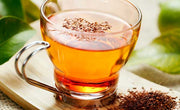What is the Best Tea for Inflammation?

Inflammation. It seems it has become such a hot topic in conversations. Beyond being uncomfortable, why is inflammation bad?
Inflammation can become chronic, damaging healthy cells, tissues, and organs if left unaddressed. Chronic inflammation may also be the cause of internal scarring, killing healthy tissue, and damaging healthy cells. Put all this together, and it could lead to potentially disabling or life-shortening illnesses like cancer or diabetes.
What Is Inflammation?
Plain and simple, inflammation is your body's immune system responding to infection or injury. It may be visible by swelling, redness in joints, or chronic pain. Sometimes inflammation will also give the sensation of heat in the inflamed area.
Since inflammation is an immune system response, your body is simply doing its job. But allowing inflammation to become chronic can cause more serious health problems. Diseases caused by inflammation are no joke. These diseases can include cancer, Alzheimer’s, asthma, heart disease, joint pain such as rheumatoid arthritis, and more.
Types of Inflammation
Acute or chronic? Knowing the type of inflammation you are experiencing can help you determine the best action to take. An injury or infection can cause acute inflammation, which is typically short-lived.
An autoimmune response, allergy, or other health condition can often be the source of chronic inflammation. Long-term chronic inflammation can affect your overall health, making it critical to address it before it causes more issues.
Which Types of Tea are Best for Inflammation?
Tea drinkers know that drinking tea provides many health benefits. But when it comes to inflammation, look to the antioxidants that tea provides.
Antioxidants help fight free radicals which are unstable molecules that can attack your healthy cells and lead to inflammation. Antioxidants found in tea may help protect cells from damage. But when it comes to combating inflammation, certain teas rise to the top. Find out which ones!
Green Tea: During processing, green tea goes through minimal oxidation, which results in a high level of polyphenols called catechins. The abundant and most well-known catechin in green tea is EGCG (epigallocatechin-3-gallate). EGCG is a front-runner in helping prevent cell damage and inflammatory conditions.
Turmeric Tea: You can easily recognize Turmeric by its bright yellow color. The main active component in turmeric is curcumin which gives the spice its color. Curcumin, known for its anti-inflammatory properties, ranks high on the best tea for inflammation list. Those suffering from arthritis often turn to Turmeric tea to reduce pain and increase mobility.
Ginger Tea: We're going to the spice cabinet again when it comes to inflammation. Ginger contains nearly 40 antioxidant compounds that help combat Inflammation. Herbal medicine has been turning to ginger tea for centuries for its powerful anti-inflammatory effects.
Chamomile Tea: If you think of chamomile tea as a calming flower tea, take another look. Ayurvedic medicine has used Chamomile tea as an anti-inflammatory and antioxidant resource for centuries.
Black Tea: Even though black tea is highly oxidized, it is still another cup to consider as an anti-inflammatory tea. Black tea contains a polyphenol called theaflavin that is responsible for helping reduce inflammation and promote overall health.
Peppermint Tea: Another herbal tea makes the list for best tea for inflammation. Peppermint tea contains phenol and flavonoids that help to reduce inflammation and pain. Mint teas also provide analgesic properties which may help soothe headaches and muscular tension.
Hibiscus Tea: Hibiscus tea also contains anti-inflammatory properties that help assist the body to reduce cortisol, known as the stress hormone. A build-up of cortisol can lead to high blood pressure, clots, and inflammation.
Dealing with inflammation is not an overnight cure. It is a lifestyle.
If you are dealing with a chronic health condition such as inflammation, remember to always consult with your doctor.
SOURCES:





